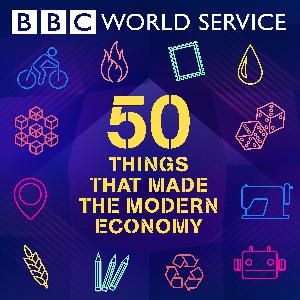Discover 50 Things That Made the Modern Economy
50 Things That Made the Modern Economy

100 Episodes
Reverse
There are more than 36,000 McDonald's restaurants around the world - but if the McDonald brothers had had their way, that might never have happened. Tim Harford tells the story of how milkshake-mixer salesman Ray Kroc turned their burger business into a global giant, and explains the principles that made his franchising model such a success.
Surveillance cameras were invented so Nazi scientists could observe rocket launches from a safe distance. They've come a long way since then, and are gathering more data about us than ever before. But in a world where millions happily carry smartphones in our pockets, how do we really feel about being watched?
As populations age, pension systems around the world are coming under strain. Governments, employers and economists are searching for ways to alleviate the problem - but could traditional societies hold some valuable lessons?
Why does Father Christmas wear red and white? It's not for the reason you may think. In an updated version of an episode from 2018, Tim Harford tells the story of Christmas and consumerism.
Women's lives were transformed by sewing machines, which made a "never-ending, ever-beginning task" far less arduous and time-consuming. But Isaac Singer, who made his fortune from these devices, was far from a champion of women's rights. Tim Harford tells a story of how self-interest can sometimes be a powerful driver for social change.
Data is a hugely profitable commodity - if you know how to process it. Tim Harford tells the story of Herman Hollerith, and how his 19th-century machine for processing census data laid the foundations for some of the world's most valuable companies.
In theory, stock options should motivate executives to perform better by tying their pay to their company's performance. So why do some argue the practice has just become a way for the highest earners to boost their salaries even further? Tim Harford turns to ancient Greek philosophy and Bill Clinton's presidency in search of the answer.
Tim Harford goes back to the 1900s to tell the story of how charity fundraising became big business. But in the social media age, what's the most effective way to get people to give?
The Society for Worldwide Interbank Financial Telecommunication - SWIFT - solved some big problems with international financial transfers, making them more secure and reliable than ever before. However, as Tim Harford explains, the global political climate means it might now be facing its greatest challenge.
Josiah Wedgwood is arguably the best-known name in the history of pottery - but it's not just his pots that made their mark on history. Tim Harford explains how a business model Wedgwood devised in the 18th Century still underpins the modern fashion industry.
Spectacles have been around for centuries, and have a huge impact on many people's quality of life. So why is it estimated that more than two billion people aren't aware that they need them? Tim Harford considers the difference that seeing clearly makes to the world.
In 1952, economist William Vickrey devised an innovative system of turnstiles to help solve a major problem on New York’s subway network. It never became a reality, but, as Tim Harford explains, the idea behind it has had a major influence on how companies decide what to charge us for goods and services today.
How dependent is the world on GPS - and what would happen if it stopped working? Tim Harford explains why it's not just our ability to navigate that would be affected.
In 1881, James Bonsack developed a machine that made it far easier to mass-produce cigarettes. But at the time, other tobacco products were much more popular – so manufacturers had to find new ways of getting people’s attention. Tim Harford explains why the methods they devised are still working on consumers today.
When the US outlawed the manufacture and sale of alcoholic beverages, it inadvertently created one of the most successful black markets in the world. Tim Harford considers how much it costs to make something illegal, and what a failed law reveals about the way criminals make their money.
Arpanet was a computer network developed in the 1960s that paved the way for today's internet. At its heart was the Interface Message Processor: a massive, heavily armoured box containing the technology that made it possible. Tim Harford takes a look inside.
Developed for the military, dodging bureaucracy and fuelled by venture capital: canned food blazed a trail many of today's biggest tech innovations have followed. Tim Harford reveals the surprising lessons and cautionary tales lurking under the lid.
Tim Harford tells the story of how Honoré Blanc, a gun-maker in 18th-century France, transformed the way the world manufactures things - but couldn't benefit from his own innovations.
The price of oil is arguably the most important in the world economy. How did we become so dependent - and are we ever likely to wean ourselves off it?
It's claimed that some computers can now pass the Turing test: convincing people that they are human. Tim Harford asks how important that distinction is, and what it means for the future of human interaction.





